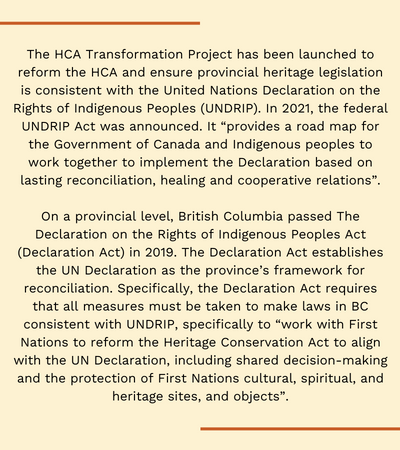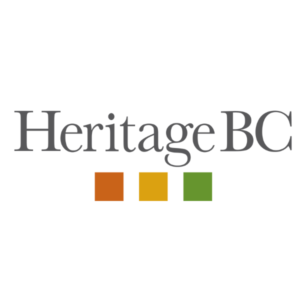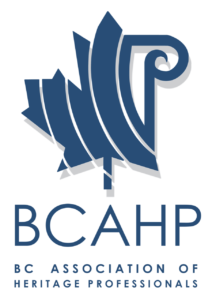A summary of our response to the Heritage Conservation Act Transformation Project (HCATP)
Heritage BC’s written response in October 2022 on the Heritage Conservation Act Transformation Project (HCATP) was developed in partnership with BC Association of Heritage Professionals (BCAHP) and jointly submitted with them. Several heritage professionals including Heritage BC members, archaeologists and individuals who have first hand experience with the limitations of BC’s Heritage Conservation Act were involved in its writing. What follows here is a summary of our submission.

Heritage BC expressed unequivocal support for the reason behind the Project.
Our submission focused on the theme of resourcing to support heritage management and we expressed how we feel it is important for the Heritage Branch to be equal and active co-leads in the transformation process with the Archeology Branch.
We reminded those involved with the HCATP engagement that in 2018/2019, the BC Heritage Branch (within the Ministry of Forests, Lands, Natural Resource Operations and Rural Development at that time) commissioned Heritage BC to conduct round tables across BC on the ‘state of heritage’ in the Province. One of the messages we heard, clearly articulated, was that the Heritage Conservation Act needed to be modernized to reflect current international standards for heritage conservation. The Heritage Branch also published their own response to this intensive community engagement. Together these two reports reflect the heritage sector’s unwavering commitment to bringing about an improved Heritage Conservation Act so that there is equity and inclusion for the concerns of indigenous perspectives.
We requested that our The State of Heritage (2019) be included along with the other engagement initiatives and papers that are informing the HCATP.
We know that there is full recognition that BC’s current HCA inappropriately divides two related disciplines – archaeology and heritage conservation – and that this is further worsened by the inclusion of the date of 1846 as a criterion for automatic protection of heritage resources. This division in the HCA is clearly in conflict with the unified understanding of heritage in BC today, which reflects national and international definitions, and includes both tangible and intangible heritage and is not limited to specific dates or specific groups. We agree wholeheartedly that the existing divisive approach in the HCA is a hindrance to reconciliation.
With the existing HCA divisive approach in mind we expressed our concern for what seems like the exclusion of the Heritage Branch from the leadership and administration of the HCATP. This impression was made from the public stakeholder engagements that Heritage BC and many of our members participated in. There was an absence of the Heritage Branch. So, we asked the question why in this important ‘once in a generation’ process to transform the HCA, was the Heritage Branch not more active in the public stakeholder engagement process? Our question was to hopefully ensure that HCATP’s mandate will be strong enough to ensure that the HCA becomes a tool for the entire heritage sector, so that there is reduced fragmentation of the sector and division between people and communities.
In response to our letter we were assured by the Heritage Branch that they are intimately involved in the Transformation process and will be remaining active in subsequent engagement phases. This is positive reassurance, as the heritage sector has understood for many years that good conservation tools and initiatives should be beneficial to all people, places, and times in our collective and individual histories, and there is no room to have process perpetuate a division between heritage and archaeology.
We also offered principled feedback that relates to the HCATP’s identified priority themes:
- Decision Making
The heritage sector as a whole, and heritage professionals and planners specifically, are already aware of, and are attempting to practice and incorporate best practices that embrace principles from documents like the Truth and Reconciliation Commission of Canada: Calls to Action and the United Nations Declaration on the Rights of Indigenous Peoples (UNDRIP). We are dedicated to breaking down perceived silos between archaeological and non-archeological resources and between intangible and tangible heritage resources, which are valued in both indigenous and non-indigenous communities. We are finding innovative ways to identify and conserve heritage resources and to acknowledge the importance of both intangible and tangible heritage. We do this despite the HCA, one of our primary tools, because HCA not aligned with these best practices and with how heritage policies address heritage at risk. We instead lean on a pan-Canadian resource for our sector, The Standards and Guidelines for the Conservation of Historic Places in Canada. It is a widely accepted professional approach that codifies heritage best practices for inclusive heritage conservation decision-making, and unlike the HCA, is aligned with current international thinking about heritage conservation.
- Resourcing to Support Heritage Conservation
The Heritage Conservation Act works within several government systems, but most closely with the Archaeology Branch. Yet, many of the problems that heritage professionals and advocates face derive from the operational and philosophical divisions and differences between the Heritage Branch and Archaeology Branch. The HCATP must put in serious effort to better align these government programs, because they need to function effectively and collectively to support whatever transformation occurs with the HCA. The new system must step away from the policy heavy approaches that characterize the current processes for permitting and unduly burden heritage in BC. In this time of reconciliation, and a focus on decolonization, neither the Heritage Branch nor the Archaeology Branch should draw lines of separation but should instead step forward together to be active leaders to the entire sector. Both systems are grossly underfunded and heritage deserves better when studies demonstrate consistently that heritage is a vital and dynamic foundation for resilient communities.
- Indigenous Values and Rights Recognition
Under the Local Government Act, local governments have an array of tools to enable heritage resource management and protection. The empowerment of local governments to identify, recognize, and protect the places that matter to them shines a light on the fact that the current system is inequitable to First Nations governments, which do not have a similar range of tools to do the same for places of significance to their communities. Heritage suffers because there is a gap for First Nation communities to be able to recognize, protect and regulate their own places of heritage significance. Perhaps the HCA could be the place to address this gap?
December, 2022

Kirstin Clausen, Executive Director
Heritage BC is a service organization that supports the heritage sector through skill development, advocacy, capacity building and grant funding. The BC Association of Heritage Professionals supports heritage professionals in public, private and not for profit sectors with standards of practice. Together, our two organizations represent both heritage professionals and heritage advocates working across British Columbia. Heritage BC has a diverse membership including not for profit historical societies, historic sites, and museums, local municipal governments and First Nation governments as well as a range of people and organizations interested in intangible cultural heritage.


